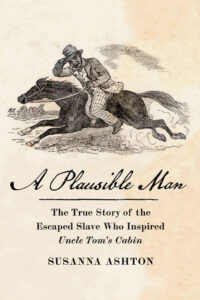Susanna Ashton teaches at Clemson University in South Carolina and holds a Ph.D. from the University of Iowa. A former Fellow both at Yale and Harvard as well as a Fulbright scholar, her work has appeared in both scholarly and popular venues. Meet Susanna:
What is your most recent book and what inspired you to write it? My latest book is A Plausible Man: The True Story of the Escaped Slave Who Inspired Uncle Tom’s Cabin (NY: The New Press 2024). I track the strange and marvelous unknown story of John Andrew Jackson, a man who escaped from a plantation labor camp and hid with Harriet Beecher Stowe, the author of the most popular book of the entire 19th century, Uncle Tom’s Cabin. Well – aside from the King James Bible, that is. Anyway, his encounter with Stowe was really unknown until I put his story together, and I argue that this was a pivotal encounter for both Stowe and for Jackson. In a way, two books came out of the meeting as he went on to  write the story of his own life as well. Anyway, Jackson escaped to Canada and then lived in England for a decade or so, getting into all sorts of adventures and conflicts along the way. The man loved drama. But after the Civil War was over, he returned to the USA and had another crazy three or four decades traveling between the North and the South, trying to weave the country together.
write the story of his own life as well. Anyway, Jackson escaped to Canada and then lived in England for a decade or so, getting into all sorts of adventures and conflicts along the way. The man loved drama. But after the Civil War was over, he returned to the USA and had another crazy three or four decades traveling between the North and the South, trying to weave the country together.
I had come across Jackson’s life story while doing some research and realized that, unlike many slave narratives, his story was funny at points! It’s not hilarious; it tells of too much pain. But he’s witty and wry with a clever kind of edge. During his escape, for example, someone asks him, “Whom do you belong to?” and Jackson later writes in his memoir, “It was none of their business. I was trying to belong to myself!”). I wanted to know him. And so, I started looking deeper into his story. When I realized he had hidden with Harriet Beecher Stowe, the only fugitive slave she had ever secreted in her house, I knew I had a beginning, not an end, to a story.
How do you hope your book uplifts those who read it? Reading about flawed people who are still essentially steered by love and hope is something that can speak to everyone. Jackson, for example, was probably a bit of a hustler. He raised money for charity, and that money really did get where it was going, mostly… I’ve seen receipts. But did he occasionally line his own pockets? Umm, maybe.
The real heroes I found were often the communities themselves. After the war, for example, I found that clusters of survivors of slavery were drawn to each other and settled together within the protection of free Black Northern communities, for example. While those free Black folks couldn’t really understand their experiences or what was certainly a kind of PTSD, I like to imagine that the folks in their community surrounded and protected them; that story happens again and again in my book… I found a church community that was quite poor in Massachusetts, and nonetheless, raised significant sums for charitable relief efforts down in South Carlina. So, I hope readers can see in my book all these communities taking risks or making sacrifices out of love. That’s a story I think can help us all.
What are you most excited about with this book? Nerdy as it may sound – I love the structure of it! The press helped me enact a vision that was a bit different from most historical biographies. I wanted readers to get excited by the hunt as well as the story— and without being too professor-like or scholarly, I wanted to teach, inspire and enable readers to think, that, hey, I can do this, too! So, with that in mind, each chapter opens with a picture of a document – maybe a receipt, a census page, a court case, a letter or maybe a newspaper advertisement. Then I spend a page just unpacking how to read the document and how we can understand it – which when you are looking for info about women, Black people, or poor people, not to mention fugitives or people looking to AVOID notice, it calls for new techniques. Then I move into the full story of that chapter and what was going on in Jackson’s life. But highlighting the ways to understand how to look over these otherwise dry and intimidating slips of paper with empathy, imagination, and courage was so fun for me to showcase and I hope it speaks to my readers.
Being an author today is like running a business. How do you manage all your publicity, social media and keep your engagement up with readers? I’m learning as I go! I set a goal for myself over the past year to learn more and to get help (and pay for it) when necessary (honing my website design, for example). I’m not a spring chicken when it comes to tech, but I’m determined. On the other hand, I have a day job! And three kids! Hence, I decided to commit three hours, one day a week, to serious social media work…creating posts, creating a photo or moment worth sharing, working with Canva, sharing stories, commenting on the posts of others that are meaningful to me, and watching little videos to teach myself at least one new small skill every week. I put it on my calendar, and so far, I have been able to build out my brand but also to connect with some interesting people and worlds I wouldn’t have connected with before. So that’s worked for me. Well, mostly…I’ve made mistakes and I still cannot sort out my subscriber lists. But, hey…it’s a process.
I do a bit of professional social media on other days when it seems right, but just knowing that every week I’ll share something keeps me on task, while keeping me from getting overwhelmed. Look for me on Thursdays! I try to do a professionally oriented Twitter post, a LinkedIn post, a Facebook post and add a bit to my research blog, the Runaway Chronicles.
What do you find most fulfilling in the career that you’ve chosen? Sometimes, when I do this work into the lives of people in bondage, it can seem so sad. But I’m tough. I do this for a living. Sometimes, I am a bit too hardened by it. But then, when I’m teaching or when I am talking about my projects with people, I have to slow down and zero in on the details that showcase the most human moments of it all… those are the beautiful stories, the hopeful and proud ones. In these partisan times, so much gets coded as liberal or conservative, but this history tells us that those labels are useless and we need all sorts of heroes to move forward, together.
Connect with Susanna, read her blog, and get a copy of her new book via her website.


Amazing! Thank you for finding this important person in our history and for caring about telling his story.